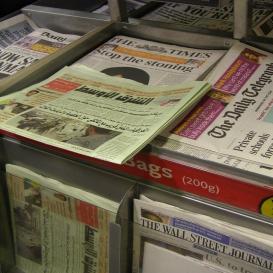It all started with an idea – in the middle of February, Emily Reynolds, Mollie Goodfellow, Ellie Mae O’Hagan and others got together to discuss how more women working in journalism can be recognised for their work. The conversation started after news emerged that the shortlist for the National Press Awards, organised by the Society of Editors, had less women as nominees compared to men.
I am SO excited and proud to announce the first Words by Women Awards. Kay Burley & Janine Gibson and so many more! pic.twitter.com/VymInNwBlU
— Emily Reynolds (@rey_z) February 18, 2016
Goodfellow, a political journalist for Sky News, in a telephone interview, said the idea then began to take shape. She had noticed a lot of women working in reporting, but not a lot of women in senior editorial positions, and said the recognition was necessary.
“There isn’t a shortfall of women in journalism in the UK, somewhere they don’t get the same recognition that men get.”
The idea that took off
A couple of days later, presences on Tumblr and Twitter were established, and a judging panel consisting of some of the most prominent female journalists in the UK, was announced. By the time the award nominating period closed on 27 February, there were over 500 nominations, nominations made by both men and women.
Very excited to announce the Words by Women Awards 2016 shortlist. https://t.co/5FNdiHp9As pic.twitter.com/sKOjmy50pG
— Words by Women (@WBWAwards) March 1, 2016
Tom Ryan was one person who sent a nomination. Ryan, who works with the Henley Literary Festival, said in an email that the fact that 20 women on the shortlist did not strike the organisers as odd, though he wasn’t surprised. He nominated a colleague for her work in children’s factual programmes.
“I think these awards have done a great job of steering the conversation,” Ryan said. “They assembled a fantastic, varied top-level panel in such a short period of time that it gives lie to the usual excuses about the poor gender split of judges.”
A need for reform
Ryan says that the older institutions, existing beyond Twitter, are definitely taking note. The Society has since announced that it has formed a committee to look at the issue and to figure out how to be more inclusive of women in journalism.
The Press Awards will set up an advisory panel to look at inclusivity of women in the media https://t.co/3VkE9jR7J5 pic.twitter.com/qstnSHZZnk
— Ellie Mae O’Hagan (@MissEllieMae) February 26, 2016
Goodfellow says though that the purpose of these awards are not to be a kick at men.
“These awards are not here to kick men,” Goodfellow said. “We do these awards because women work hard and deserve recognition.”
The Society of Editors did not respond to a request seeking comment for this piece.
The media industry also took note of the awards, and some are confident this will mean change. In a telephone interview, Catherine Gee, a journalist with The Daily Telegraph, said this was a necessity.
“Women are raised generally not to push themselves as much as men,” Gee said. “It’s often just a case of not bothering to enter.”
Gee adds that it’s unfortunate that it’s a trend, but is hopeful that more progress can be made.
“We’re not a homogenised group,” Gee said. “We’re a group of individuals.”
‘Won’t sit quietly about it anymore’
Lizzie Dearden, an online news reporter for The Independent, in a telephone interview, said the timing of these awards were crucial, yet says it’s sad that something like this needs to be arranged.
Dearden says though the awards have already started to have an impact.
“The response to it has been massive,” Dearden said. “It’s just started a discussion which hasn’t been had about women are recognised and awards are carried out.”
Harriet Minter, the head of women in leadership for The Guardian, in a telephone interview, said the work was enterprising and how brilliant the response to the problem was.
Very excited to announce the Words by Women Awards 2016 shortlist. https://t.co/5FNdiHp9As pic.twitter.com/sKOjmy50pG
— Words by Women (@WBWAwards) March 1, 2016
“They were born out of oversight by the Press Awards,” Minter said. “These actions are in response to behaviour steeped in tradition. It shows how frustrated women are with the situation. We won’t sit quietly about it anymore.”
Minter says more work must be done to train journalists, both men and women in-house, as she worries that students will enter the industry with a lack of jobs and more debt. She says though there can be equality in journalism, but that can be a painful process.
“There can be equality in journalism,” Minter said. “It comes down to good stories, good writing, good connections and how you build them. This is the same problem in every industry — society is structured to promote a specific type of man. We’re trying to change that. Maybe that change is too slow or too fast, but it is happening. It will be a painful process.”
The awards are to be held on 21 March, and Goodfellow says she hopes this will instill more confidence in women.
“Things are getting better. We are standing up for ourselves. We are starting to fight for ourselves. Don’t be put off by the domination [by men]. Use this to inspire you.”
Ultimately, the message of these awards, Goodfellow says, is a simple one that guides the principle ideas of these awards.
“There are women in journalism – we deserve as much recognition as men,” Goodfellow said. “If you’re not going to give it to us, we’ll get it ourselves.”
What do you think? Do you think these awards can change how women are viewed in journalism? Have your say in the comments section below.









